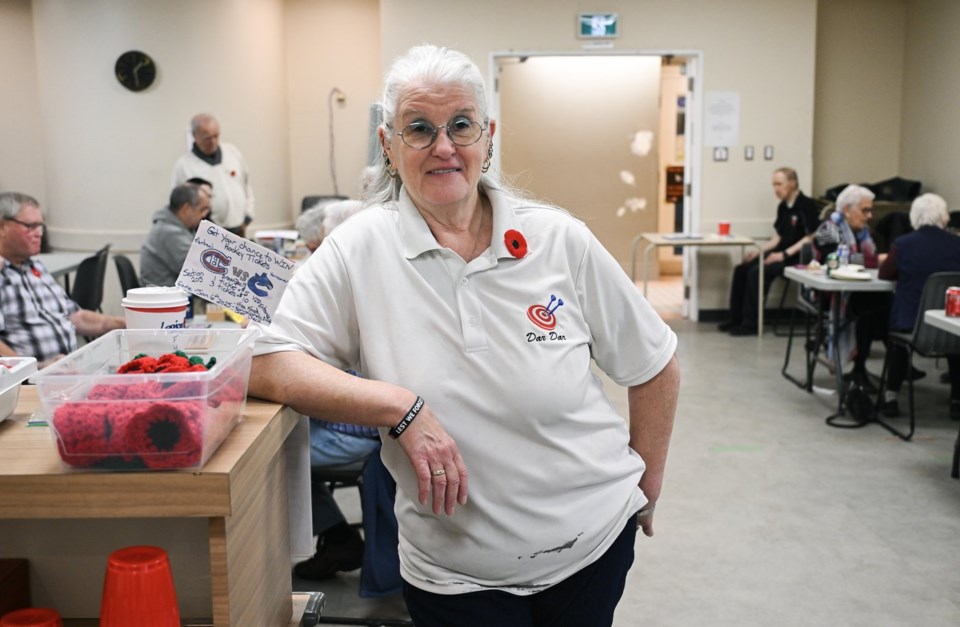MONTREAL — The Royal Canadian Legion branch in Montreal’s Verdun borough meets once a week in a community centre space it rents by the hour, less than 500 metres from the elegant brick building it sold over a decade ago when maintenance costs got too high.
After years of rising rents, a forced move and general instability, its members are happy to have somewhere to meet. But president Darlene Harrison says one question keeps coming back: “When are we going to have our own home again?”
It's a question she doesn’t know how to answer. She recently went to check out a space, only to find out the rent was $6,700 per month — not including costs like phone and internet.
“All of these things cost money, and until we can generate the funds to cover it, it's really not feasible at this point in time to try to rent a locale,” she said in a recent phone interview.
Her branch isn’t alone. Even as they fundraise for other community organizations, some legions are having trouble keeping their own lights on amid rising inflation and maintenance costs.
The legion in Grenfell, Sask., recently made the same decision as Verdun and listed its building — a former armoury — for sale.
It's a matter of “aging membership and aging buildings,” president Ken Box said. With only about 85 members, many of whom no longer live nearby, keeping the building just didn’t make sense.
“We spend way too much of our time fundraising to pay for the expenses on the building, and that takes away from what we're supposed to be doing, which is supporting veterans and the community and promoting our members,” Box said in a phone interview.
Once the building sells, he said, the legion will move to another space owned by the city, allowing it to focus on its "core values."
Other legions are fighting to keep their buildings open, one spaghetti dinner, dance and bingo game at a time.
That's the case in the Cape Breton town of Donkin, N.S. The legion hall was hit hard by post-Tropical Storm Fiona in 2022, which caused extensive roof damage and sent insurance rates shooting upwards.
Against all odds, the legion has managed to pay off its debts and stabilize its finances — something president Wayne Boutilier credits to community support. He said the weekly dart league, businesses that donated goods for a draw, and former residents who continue to pay their dues from other provinces made it possible. More recently, the legion rented its building to the Nova Scotia government for seven weeks to use for the provincial election.
"We've got everything pretty much paid off now that we owed," the former coal miner and retired oilfield worker said. "But you still get your regular bills, like your lights, your heat, your internet."
While small, rural legions like Donkin's may be the most vulnerable, they're not the only ones that struggle. The branch in the eastern Ottawa neighbourhood of Orleans has 800 to 900 members, but it had to turn to GoFundMe to help pay the bills during the COVID-19 shutdown in 2020. Its president says the branch's 30-year-old building is still showing its age, and income has not kept up with the rising cost of utilities and maintenance.
"Our main source of income is hall rentals, and we need to update our facilities to attract more rentals," Wyn Fournier wrote in an email. "However, we don't have the income to spend money on that. It's a nasty circle."
The Royal Canadian Legion said in an email that while a few of its branches may be in trouble, they represent "a very tiny percentage of the whole" and "would not be indicative of what’s going on provincially or nationally." It noted that overall membership is growing, and that two new branches have recently opened.
The COVID-19 pandemic forced branches to temporarily shut their doors, depleting their financial reserves and putting many at risk of closure. Since then, the situation has stabilized, but the legions that spoke to The Canadian Press say they're still struggling to rebuild lost savings and lure people back to in-person activities.
The Kingsway Branch in Edmonton, whose finances suffered during the pandemic, is no longer at risk of closure, though financial chairman Ron Wills says it hasn't fully recovered.
"We're still having financial difficulties. We're still living paycheque to paycheque, so to speak," he said. He said the legion doesn't rule out having to sell its building one day, though he hopes it doesn't happen.
Rules around legion fundraising are strict. The money raised by the annual poppy campaign, for example, is reserved exclusively for veterans, leaving legions to pay their bills from membership dues and fundraisers.
Despite the challenges, legion branches say there are positive things happening. In Verdun, Harrison said, a membership drive has helped recruit new, younger members who bring fresh ideas. She's proud of the work the legion does, which includes supporting local schools and homeless shelters in addition to organizations dedicated to veterans.
She wants people to know they don't have to be a veteran to join or to offer support — and that more members are always welcome. "If you have an interest in helping and volunteering and doing things for your community, here we are," she said.
This report by The Canadian Press was first published Nov. 7, 2024.
Morgan Lowrie, The Canadian Press



